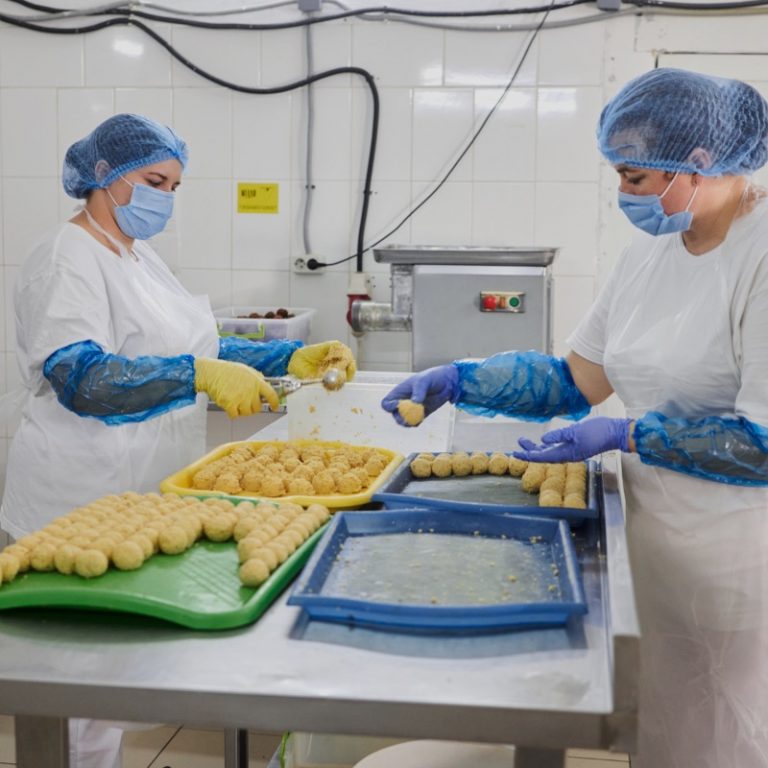In 2014, Dariia Yaremchuk from Lviv and Vadym Khrebtov from Crimea founded ‘Green’, Lviv’s first vegetarian cafe. The lack of high-quality plant-based foods pushed them to establish their own brand, ‘Zelena Korova’ (‘Green Cow’ — tr.). Now they are one of the most popular producers of falafel, tofu and soy milk in Ukraine.
Lately, more and more people are opting for a plant-based diet and giving up foods derived from animals. The Ukrainian market has seen an increase in companies producing replacements for animal-derived food products: nut, oat or soy milks instead of cow’s milk; agar-agar instead of gelatin; seitan (made from wheat flour) or tofu (soybean curd) instead of meat.
Dariia Yaremchuk and Vadym Khrebtov work together to run a group of companies centred around plant-based eating. They set up a food production company, ‘Zelena Korova’, as well as two vegetarian cafes in Lviv: ‘Green’ art cafe, and fast food outlet ‘Little Green’. Via their work, they aim to educate people about conscious nutrition and demonstrate just how versatile a plant-based menu can be.
‘Zelena Korova’ tofu and falafel can be found on supermarket shelves: for example, at ‘Silpo’, under the label ‘Lavka Tradytsii’ (‘Store of Traditions’ — tr.), which also supports this series of stories on local farmers.

Common values
Dariia and Vadym met over six years ago, at a wedding. Vadym grew up in Crimea; he has been a keen cook since childhood, and was offered a job as a chef thanks to his own wedding cake. Dariia recalls:
— They invited me to the wedding because I know Katia (Vadym’s wife. — ed.). There was a wonderful wedding cake. When I tasted it, I was amazed by the taste. I asked: “Who made this cake?”, and Vadym gave such a modest answer: “There was no time to order one, so I made it myself last night. I mixed all the ingredients I had, and that’s what I got.” I realised he had talent, that he was a culinary god. They were planning to live in Crimea. I called Katia and said: “Move to Lviv, I’m offering Vadym a job as head chef.”
Initially, Vadym wanted to open his own confectionery studio, because he particularly loved to create desserts. Eventually, he agreed to help Dariia launch the first vegetarian cafe in Lviv:
— I found it very strange that such a big city had no vegetarian cafes. At that time I lived in Yalta, where there were already vegetarian cafes that opened in high season. My wife is from Lviv, so Lviv was my second hometown. And I thought, why don’t I go and give it a try?

In the ‘green family’, Dariia takes care of organisational matters, and Vadym is responsible for the technological side of the production process, developing new recipes and menus. Their work is based on a framework of common values, since they are both vegetarians.
— We’re both interested in healthy living, and that’s exactly how our company was born. We were excited about making a product that we could not only sell, but consume ourselves.
Dariia has been a vegetarian for over 25 years. At first she had to give up meat due to health issues, but later it became a conscious choice:
— When I started my treatment, the main rule was not to eat meat and fish, since both are heavy on the stomach. After a while, I realised I didn’t want to go back to eating meat and fish. I realised I wanted to live differently, my consciousness began to change. I felt that I had more compassion for people and animals.

Vadym has not consumed animal products for about eight years. He tries to convey this philosophy to people through his work:
— Originally my attitude was just: well, animals are animals. Now I have a feeling of oneness, of being very close to them. You understand that this is also a living being, so if you can, why not avoid taking its life just for the sake of food?

The first vegetarian cafe in Lviv
‘Green’ vegetarian cafe was opened in the spring of 2014, on Brativ Rohatyntsiv Street in the centre of Lviv.
— Before we opened here, [the street] was, let’s say, dead. Nobody walked here like they do now. With our cafe, we got it going. People started walking this way, cafes opened up nearby.
As head chef, Vadym Khrebtov was faced with a task that was totally new to him: developing a balanced menu:
— I just went online, downloaded the material from the first and second years of culinary college, and studied it. I read up on how to make costing cards, how to calculate calories. It really fascinated me. We were spending 14 to 15 hours in our kitchen, developing our dishes before the opening, thinking about how it would be for our customers.
The cafe menu changes every four months. As Dariia explains, this constant development is meant to show just how versatile and balanced vegetarian cuisine can be.
— We were meticulously searching for different recipes, because vegetarianism wasn’t so common back then. Vadym experimented a lot, so as to have both proteins and carbohydrates — all the essential nutrients.
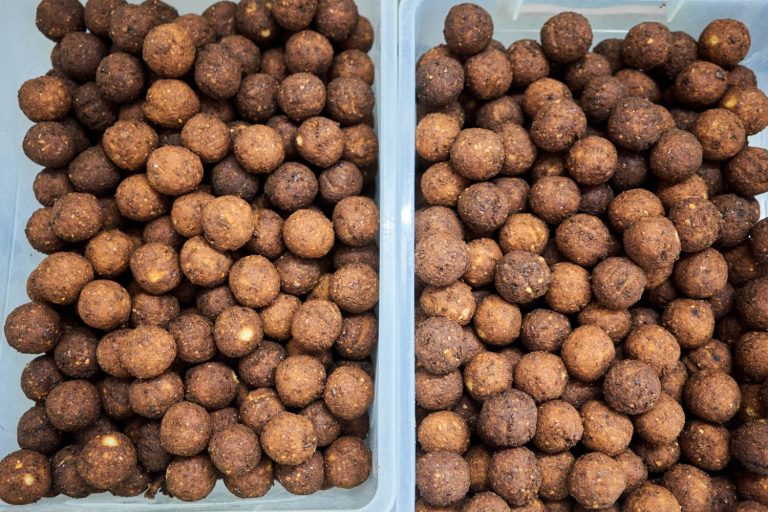
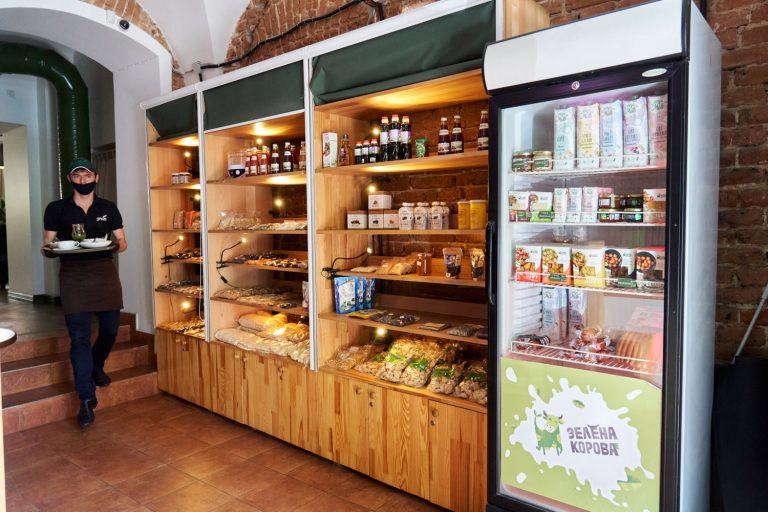
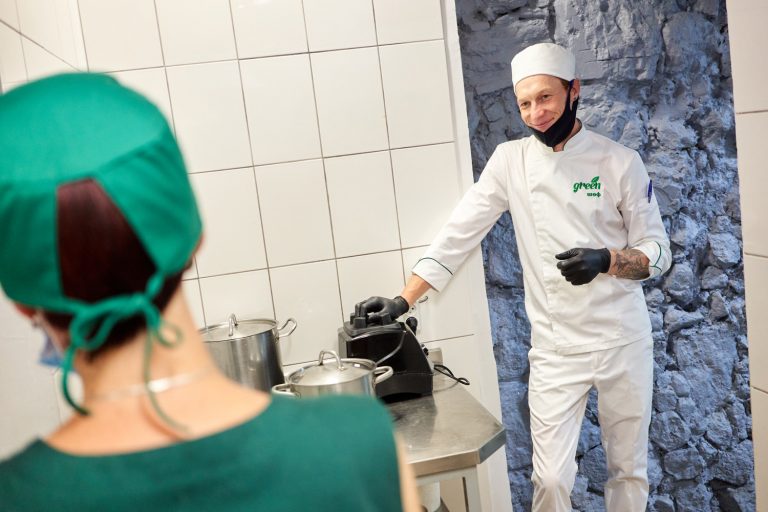
slideshow
Vadym says that one of the most popular dishes in the cafe is falafel with three types of hummus.The recipe took about two years to develop, as they were seeking the perfect result: not dry, not raw and not overcooked.
— If one of our guests wants something specific, and a lot of people ask about it, we will definitely make it happen. It might take a long time, but we will do it. Hummus is made from chickpeas, just like falafel — it’s kind of like ‘chickpeas on chickpeas’, as some people say. But this dish is very nutritious, very filling, and delicious, so you should definitely try it.
Before launching a new menu or new dishes in the cafe, they usually arrange tastings and listen to their guests’ opinions.
— In the past, we’ve even had ‘tasting commissions’. I create sample dishes for a new menu, everyone tastes them and gives their opinion, and I write it all down. Then we might remake something, or remove something, so that the dish is to everyone’s taste. We want our raw vegan recipes to be delicious for everyone: not just for raw vegans, but also for people who aren’t even vegetarians.
According to Vadym, at first it was difficult to find suppliers of quality products, but now the number of companies that make plant-based products is increasing. While developing a menu for the cafe, he did not neglect his most beloved of the culinary arts: confectionery. He began an even more detailed study of the technical aspect of vegan dessert production:
— Here, I basically started confectionery all over again, because back then it was impossible to find any recipes online. There were some indications, like substituting ‘a glass of oil for a glass of flour’, but I didn’t get why. I started studying the technology, how fats, sugars and thickeners work. I found a little information by searching foreign websites. Here, too, we’re constantly thinking about what we can do to please everyone.

‘Green Cow’
‘Green Cow’ produces plant-based foods: tofu, pâtés, snacks, bean and nut spreads. They chose soy as the basis for many of their dishes. Soybeans are the most popular meat substitute, with high nutritional value. They contain 40% protein and 20% fat, an assortment of essential amino acids, calcium, potassium and fibre. Soy protein is relatively easily digested by the body and does not overburden the stomach.
— Soy is our main raw material: it’s in almost all our products, starting with tofu. Tofu is an ideal product for vegetarians and vegans: it contains a lot of protein and does a good job of filling you up, but it’s not heavy and doesn’t contain a lot of cholesterol. People who stop eating meat worry about getting enough protein in their diet — and tofu has it.
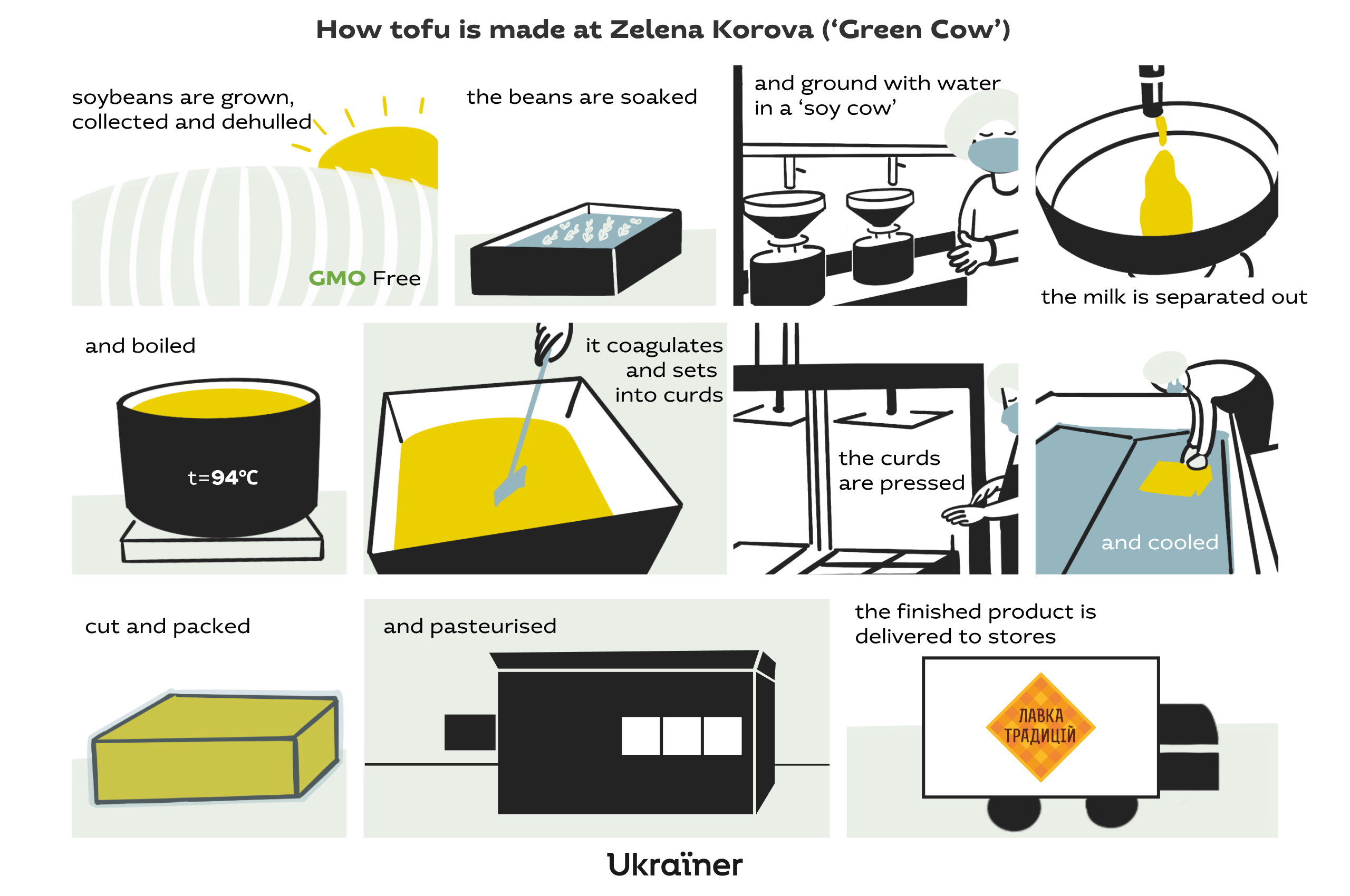
Dariia and Vadym first started making tofu for their cafe, ‘Green’, as at that time they could not find any suppliers of traditional Asian tofu in Ukraine. Vadym says the taste of tofu is influenced by the type of soybean used, and its ratio of fat to protein. However, there is one more detail, and that is the use of different enzymes:
— When I tried tofu from various countries, I couldn’t understand the difference: why does this one taste like this, and that one like that? It’s because of the different coagulants used. Traditionally, salts are used, but in our country they chose acids. For some reason that’s what happened. And that’s what really affected the taste.
The company owners bought a small ‘soy cow’ — a soybean processing machine that produced only 100 kg of soy milk per hour. Later, when they realised that their soy products were in demand, Dariia and Vadym bought a larger machine and expanded their production.
‘Zelena Korova’ produces tofu using traditional Asian technology. Soaked soybeans are ground in a ‘soy cow’ with added water. The resulting substance is filtered: the soy milk is separated from the pulp (also known as okara). The milk is then heat treated. Just like cheese, tofu is created by a process of coagulation. The curds are distributed into moulds, pressed and cooled.
Here, the soy milk undergoes two stages of separation. According to the makers, this method enables them to get the maximum amount of protein from the soy. Currently the okara is collected for recycling, but Vadym hopes there will be a way to optimise this process:
— I’m an ecologist by profession: for me, ecology is also part of life, and I try to stick to that in everything I do. From an environmental point of view everything [in our manufacturing process] has turned out very well. The only thing we hand over for recycling is the okara. We’re still looking for opportunities to make something out of it, to avoid recycling altogether, to make our manufacturing process clean.
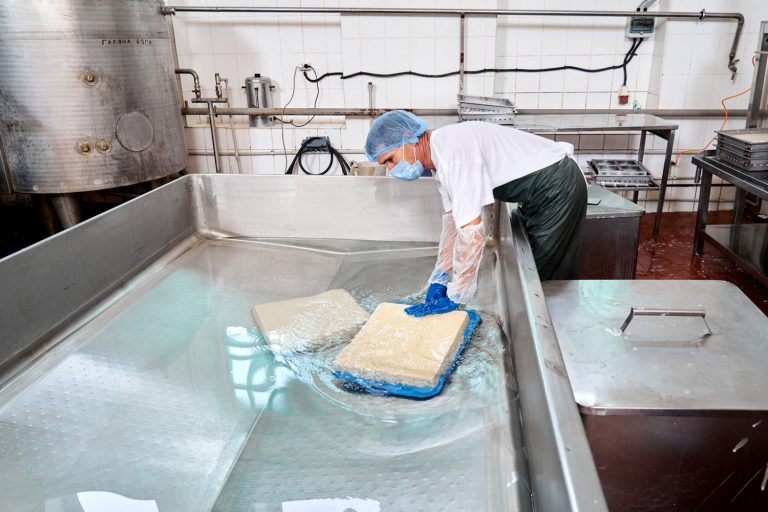
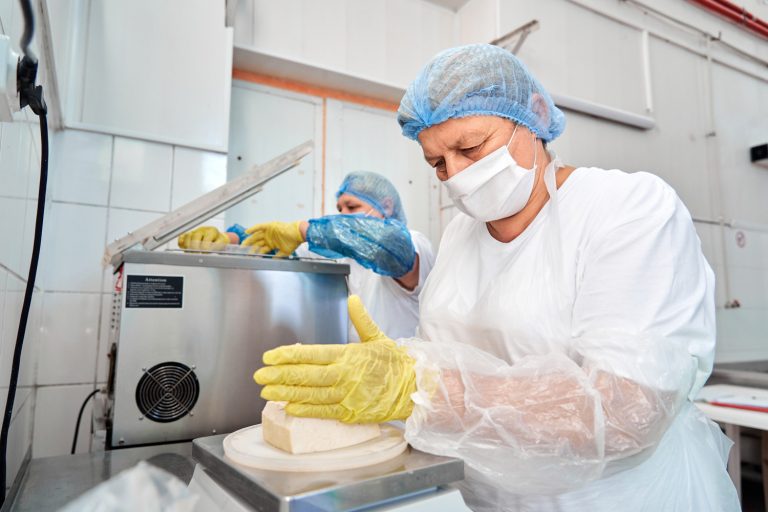
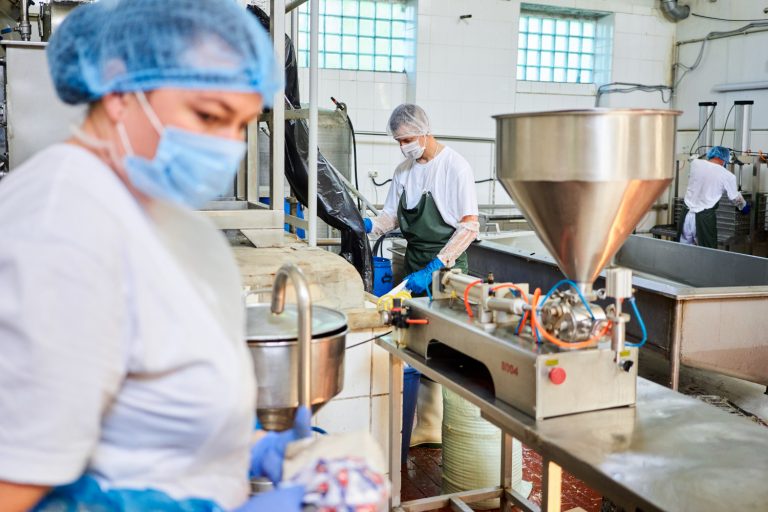
slideshow
Soy milk can be used to make tofu with different flavours and seasonings: for example, with vegetables, curry, fried adzhyka or tomato sauce. Due to its high protein content, tofu is sometimes known as ‘boneless meat’. ‘Zelena Korova’ sells ready-to-eat tofu, but Vadym also recommends that people try making tofu at home and tasting it fresh:
— At least once in your life, even if you aren’t vegetarian, try making tofu at home and taste it fresh, while it’s hot. You’ll get to know it in a completely different way. It’s very soft and tender, and it tastes amazing.
In addition to soy products, ‘Zelena Korova’ also produces vegan pâtés and sausages, hummus from chickpeas and sesame paste, as well as falafel made from chickpeas, rice, okara, soy sauce and mixed spices.
For frying, they use ordinary refined oil, monitoring its quality: the acidity level is measured twice a day. Dariia and Vadym are thinking about a substitute for refined oil:
— That’s probably the only drawback in our process; a lot of people mention it. We’ve tried to find other oils, but for now there isn’t anything available in our country.
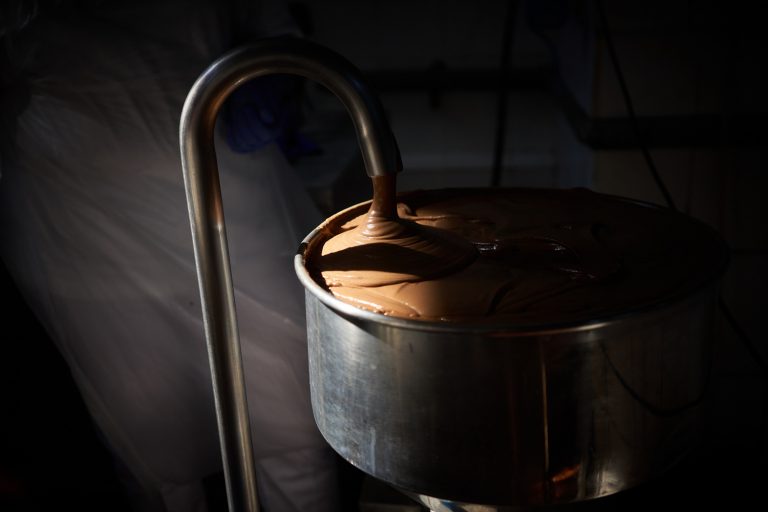
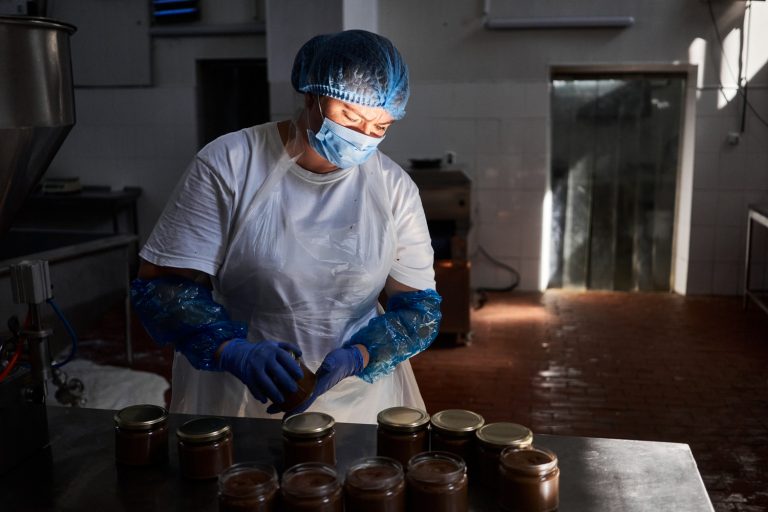
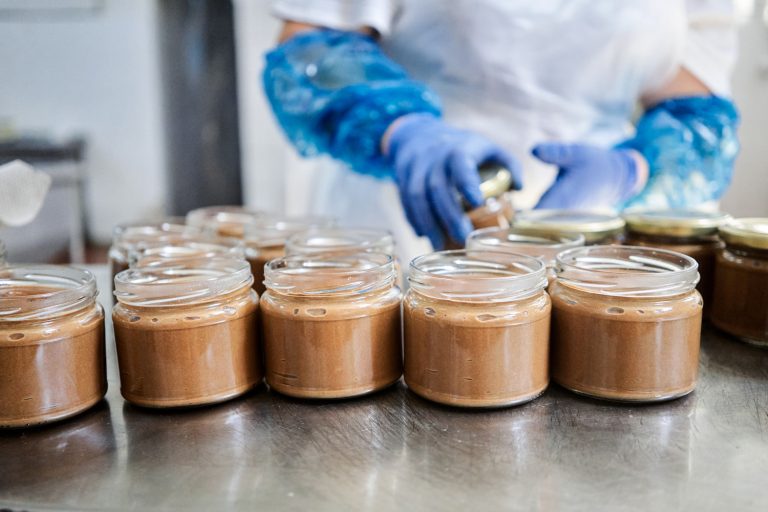
slideshow
For their products, the founders of ‘Zelena Korova’ try to use ingredients grown in Ukraine. The peanuts and chickpeas are tested for mycotoxins (toxic compounds produced by fungi that affect crops. — ed.) and for traces of pesticides:
— Before buying a batch of anything, we go directly to the farmer who grows it. We take a test sample for analysis, we check it.
The only sweet item in the assortment is the sugar-free pasta ‘Carobella’. The producers call it ‘à la Nutella’ but with a simpler food composition and cooking process. To create such a paste, they mix only four ingredients: dates, peanuts, carob, and water.
Carob
A sweet powder made from carob pods, considered to be a healthy substitute for chocolate.— We try to reduce the number of ingredients in each of our products. The simpler the better, right? There are no preservatives or emulsifiers. It mixes well enough, and spreads nicely on a slice of bread.

Expansion of the ‘green family’
Initially, ‘Zelena Korova’ products were on sale only in Lviv, in niche health food stores. Later, they established a partnership with ‘Auchan’ and the ‘Lavka Tradytsii’ range at ‘Silpo’, and started to operate throughout Ukraine. Dariia Yaremchuk says that since the start of production, the volumes have increased tenfold.
— I think that these days, people are really taking care of their health, reconsidering their lifestyles. Maybe it’s also related to the pandemic, because people now have an interest in healthy eating, and that was actually our goal from the beginning, that’s what we wanted to give to people.
Over twenty people work at the ‘Zelena Korova’ factory. Dariia says that above all, she selected like-minded people for the team, and they also require their staff to share certain values:
— When we hire staff for the factory, our main requirement is that they do not smoke or drink alcohol. It’s also the most important requirement at our cafe, ‘Green’.

Dariia and Vadym are inspired by the increasing numbers of people who are getting into healthy eating. They also plan to open a cafe serving sweet treats:
— We have a very big and extremely tasty assortment of desserts, as Vadym spends a long time working on every recipe.
The example of the ‘green family’ proves that the key to a successful business is to love what you do. On this subject, Dariia says:
— For me, my business is my life. It’s my inspiration, it’s my creation, it’s my love. It’s the way I care for others. It’s my desire to help. It’s my cause.
supported by
This series about local farmers is supported by ‘Lavka Tradytsii’


